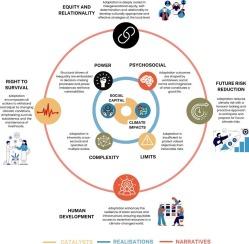Beyond adjustment: A new paradigm for climate change adaptation in a complex world
IF 9.1
1区 环境科学与生态学
Q1 ENVIRONMENTAL SCIENCES
引用次数: 0
Abstract
Climate change adaptation is central to political and scientific agendas that aim to reduce the impacts of a warming world. However, despite three decades of research and practice, adaptation remains conceptually ambiguous, lacking a clear and comprehensive definition that enables effective on-the-ground action. The foundational idea that adaptation is the process of adjusting to climate and its effects remains central to scientific advancements in the field. Yet, emerging paradigms like adaptation as justice, resilience, or development are gaining traction, reflecting a much larger variety of local needs, knowledge systems, and lived experiences. To examine the notion of adaptation through these evolving lenses, we conducted 50 in-depth interviews with key internationally recognised experts in climate adaptation, including scientists and practitioners from around the globe, with 950 years of combined experience. Over 36 h of interview time, we explored their career trajectories and evolving views to identify key narratives, realisations and catalysts that shifted their conceptualisation and practice of adaptation. Our findings support an updated heuristic framework for adaptation as a process of responding to climate change and its impacts by integrating risk reduction into broader development strategies, ensuring that all individuals can maintain dignified lives in the face of climate challenges. The framework acknowledges the inherent complexity and limitations of adaptation, blending systemic governance with psychosocial insights to address power dynamics and uphold the fundamental right to survival. Findings call for a reconceptualisation of adaptation beyond mere adjustment to risks, in response to shifting paradigms in contemporary adaptation thought and practice.

超越调整:复杂世界中适应气候变化的新范式
适应气候变化是旨在减少全球变暖影响的政治和科学议程的核心。然而,尽管经过了三十年的研究和实践,适应在概念上仍然是模糊的,缺乏一个清晰而全面的定义,无法在实地采取有效的行动。适应是适应气候及其影响的过程,这一基本观点仍然是该领域科学进步的核心。然而,作为正义、复原力或发展的适应等新兴范式正在获得关注,反映了更广泛的当地需求、知识体系和生活经验。为了通过这些不断变化的镜头来研究适应的概念,我们对气候适应领域的主要国际公认专家进行了50次深度访谈,包括来自全球的科学家和从业者,他们拥有950年的综合经验。在36个小时的采访时间里,我们探讨了他们的职业轨迹和不断演变的观点,以确定改变他们的概念和适应实践的关键叙述、实现和催化剂。我们的研究结果支持了一个更新的启发式适应框架,将适应作为一个应对气候变化及其影响的过程,通过将降低风险纳入更广泛的发展战略,确保所有人在面对气候挑战时都能保持有尊严的生活。该框架承认适应的固有复杂性和局限性,将系统性治理与社会心理洞见相结合,以解决权力动态问题并维护基本生存权。研究结果呼吁重新定义适应的概念,而不仅仅是对风险的调整,以应对当代适应思想和实践范式的转变。
本文章由计算机程序翻译,如有差异,请以英文原文为准。
求助全文
约1分钟内获得全文
求助全文
来源期刊

Global Environmental Change
环境科学-环境科学
CiteScore
18.20
自引率
2.20%
发文量
146
审稿时长
12 months
期刊介绍:
Global Environmental Change is a prestigious international journal that publishes articles of high quality, both theoretically and empirically rigorous. The journal aims to contribute to the understanding of global environmental change from the perspectives of human and policy dimensions. Specifically, it considers global environmental change as the result of processes occurring at the local level, but with wide-ranging impacts on various spatial, temporal, and socio-political scales.
In terms of content, the journal seeks articles with a strong social science component. This includes research that examines the societal drivers and consequences of environmental change, as well as social and policy processes that aim to address these challenges. While the journal covers a broad range of topics, including biodiversity and ecosystem services, climate, coasts, food systems, land use and land cover, oceans, urban areas, and water resources, it also welcomes contributions that investigate the drivers, consequences, and management of other areas affected by environmental change.
Overall, Global Environmental Change encourages research that deepens our understanding of the complex interactions between human activities and the environment, with the goal of informing policy and decision-making.
 求助内容:
求助内容: 应助结果提醒方式:
应助结果提醒方式:


